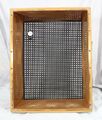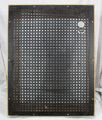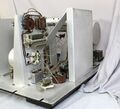736-A: Difference between revisions
(Created page with "Type '''736-A Wave Analyzer'''. ==Specifications== ==Links== ==Photos== <gallery> </gallery> Category:Wave Analyzer") |
No edit summary |
||
| Line 1: | Line 1: | ||
{{GR Product | |||
|model=736-A | |||
|codes=ASKEW | |||
|class=wave analyzer | |||
|summary=Wave Analyzer | |||
|image=GR 736-A Close-Up.jpg | |||
|caption=General Radio 736-A Wave Analyzer | |||
|series= | |||
|introduced=1939 | |||
|discontinued=1961 | |||
|designers= | |||
|manuals= | |||
* '''Manual Needed.''' | |||
* [[Media:GR 736-A Wave Analyzer Manual 508-G 1960 Poor Quality.pdf|GR 736-A Wave Analyzer Manual 508-G 1960 Poor Quality]] | |||
{{Catalog History}} | |||
}} | |||
The {{Title|General Radio 736-A Wave Analyzer}} was introduced in {{Catalog K1}} and remained available through {{Catalog Q}}. | |||
The Type 736-A Wave Analyzer is used to measure the amplitude and frequency of components of a complex electrical waveform with 4 Hz bandwith. It performs this by the heterodyne method. | |||
The band of frequencies between 20 Hz and 16 kHz are heterodyned or mixed with the local oscillator producing an intermediate frequency of 50 kHZ along with its sidebands. The frequencies applied to the input of the instrument are rejected by the 50 kHz tuned IF. A ballanced mixer cancels the local oscillator and the three stage crystal filter rejects the lower sideband. The upper sideband is then amplified by the following three stages and applied to the panel meter. The frequency dial is calibrated in the frequency applied to the panel meter. Under a cover at the base of the instrument are the calibration controls. | |||
The Type 736-A can be used to measure harmonic distortion in amplifiers and radio receivers. It also finds use as null detector at audio frequencies, the measurement of hum and as a sharply tuned voltmeter. | |||
==Specifications== | ==Specifications== | ||
* '''Frequency Range:''' 20 Hz to 16,000 kHz | |||
* '''Selectivity:''' 4 Hz | |||
* '''Voltage Range:''' 300 μV to 300 V | |||
* '''Volage Accuracy:''' ±5% | |||
* '''Input Impedance:''' 1 MΩ for direct voltage measurements; 100 kΩ when using input potentiometer | |||
==Links== | ==Links== | ||
* [[Media:GR Exp 736-A 12_1938.pdf|Experimenter December 1938 describing Type 736-A]] | |||
==Photos== | ==Photos== | ||
<gallery> | |||
GR 736-A Front A.jpg | |||
GR 736-A Front B.jpg | |||
GR 736-A Front Upper.jpg | |||
GR 736-A Front Lower.jpg | |||
GR 736-A Front Calibrate Panel.jpg | |||
GR 736-A Front Calibrate Panel Open.jpg | |||
GR 736-A Cabinet Empty.jpg | |||
GR 736-A Cabinet Rear.jpg | |||
</gallery> | |||
===Rear=== | |||
<gallery> | |||
GR 736-A Rear.jpg | |||
GR 736-A Rear Upper Right.jpg | |||
GR 736-A Lower Right Rear.jpg | |||
GR 736-A Rear Upper Left A.jpg | |||
GR 736-A Rear Lower Left.jpg | |||
</gallery> | |||
===Left Side=== | |||
<gallery> | |||
GR 736-A Center Left.jpg | |||
GR 736-A Left Side View.jpg | |||
GR 736-A Lower Left Side.jpg | |||
GR 736-A Upper Left Side.jpg | |||
GR 736-A Upper Left.jpg | |||
</gallery> | |||
===Right Side=== | |||
<gallery> | <gallery> | ||
GR 736-A Right Side View.jpg | |||
GR 736-A Right Center.jpg | |||
GR 736-A Right Lower.jpg | |||
GR 736-A Upper Right A.jpg | |||
</gallery> | </gallery> | ||
===Top=== | |||
<gallery> | |||
GR 736-A Top A.jpg | |||
GR 736-A Top Power Supply View.jpg | |||
GR 736-A Top Right Side.jpg | |||
GR 736-A Top Right.jpg | |||
GR 736-A Top View.jpg | |||
GR 736-A Top.jpg | |||
</gallery> | |||
===Bottom=== | |||
<gallery> | |||
GR 736-A Bottom Right A.jpg | |||
GR 736-A Bottom Right.jpg | |||
GR 736-A Bottom Left A.jpg | |||
GR 736-A Bottom Left View.jpg | |||
</gallery> | |||
[[Category:Wave Analyzer]] | [[Category:Wave Analyzer]] | ||
__NOTOC__ | |||
Revision as of 23:50, 17 June 2024
The General Radio 736-A Wave Analyzer was introduced in Catalog K1 (1939) and remained available through Catalog Q (1961).
The Type 736-A Wave Analyzer is used to measure the amplitude and frequency of components of a complex electrical waveform with 4 Hz bandwith. It performs this by the heterodyne method.
The band of frequencies between 20 Hz and 16 kHz are heterodyned or mixed with the local oscillator producing an intermediate frequency of 50 kHZ along with its sidebands. The frequencies applied to the input of the instrument are rejected by the 50 kHz tuned IF. A ballanced mixer cancels the local oscillator and the three stage crystal filter rejects the lower sideband. The upper sideband is then amplified by the following three stages and applied to the panel meter. The frequency dial is calibrated in the frequency applied to the panel meter. Under a cover at the base of the instrument are the calibration controls.
The Type 736-A can be used to measure harmonic distortion in amplifiers and radio receivers. It also finds use as null detector at audio frequencies, the measurement of hum and as a sharply tuned voltmeter.
Specifications
- Frequency Range: 20 Hz to 16,000 kHz
- Selectivity: 4 Hz
- Voltage Range: 300 μV to 300 V
- Volage Accuracy: ±5%
- Input Impedance: 1 MΩ for direct voltage measurements; 100 kΩ when using input potentiometer
Links
Photos
Rear
Left Side
Right Side
Top
Bottom
































